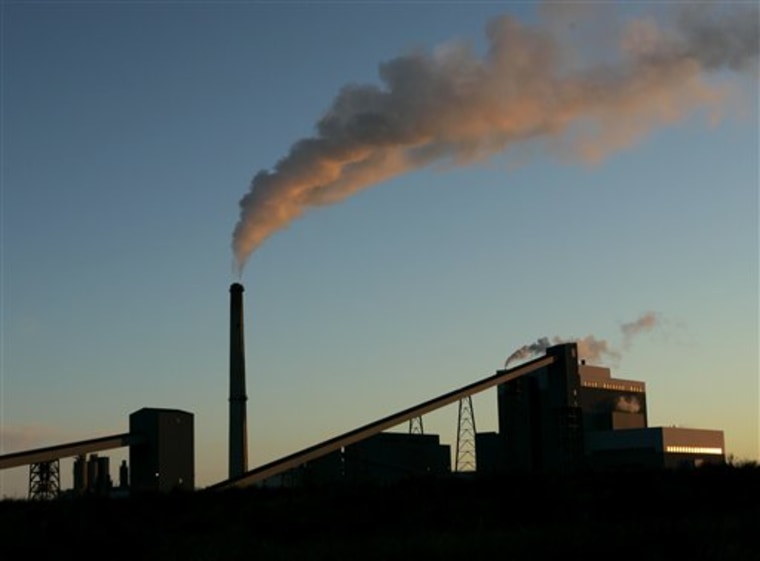Declaring that greenhouse gases are a significant threat to human health, the Environmental Protection Agency has proposed listing carbon dioxide and other greenhouse gases as pollutants under the Clean Air Act, a policy the Bush administration rejected.
The White House acknowledged that the EPA had transmitted its proposed finding on global warming to the Office of Management and Budget, but provided no details.
It also cautioned that the Obama administration, which sees responding to climate change a top priority, nevertheless is ready to move cautiously when it comes to actually regulating greenhouse gases, preferring to have Congress act on the matter.
The proposal, technically a "finding," concluded that six greenhouse gases should be considered pollutants under the 1970 act. But it does not spell out how or what to regulate. If the White House approves the finding, the EPA as well as lawmakers will start that discussion.
Potential health impacts from warming, the finding said, include longer and more severe heat waves; increased smog in some areas; dangerous flooding caused by stronger storms; and diseases, including malaria and dengue fever, related to flooding and warmer weather.
EPA Administrator Lisa Jackson suggested last month that she would declare global warming a health threat, and recent agency decisions have hinted that the agency was leaning toward making greater use of the Clean Air Act, which is already used to curb emissions that cause acid rain, smog and soot.
In his first week in office, President Barack Obama directed the EPA to review a decision by the Bush administration denying California and other states the right to control auto emissions, which, along with pollution from coal-fired power plants, are a major source of greenhouse gases.
Shift started with Supreme Court
The Bush administration refused to regulate greenhouse gases as a pollutant under the Clean Air Act, even though the U.S. Supreme Court in 2007 prodded the federal government to do so.
"I think this is just the step in that process," White House Press Secretary Robert Gibbs said Monday, noting the Supreme Court ruling. Another White House official, speaking anonymously in deference to Gibbs, predicted "a long process" before any rules would be expected to be issued on heat-trapping emissions.
Gibbs emphasized that "the president has made quite clear" that he prefers to have the climate issue addressed by Congress as part of a broad, mandatory limit on heat-trapping emissions.
Jackson has said her agency would not act alone and that any new regulations at the federal level would not prevent states from taking their own steps or preclude Congress from passing legislation to limit greenhouse gas emissions, something Democratic leaders on the Hill are already working on.
Supporters, critics
Environmentalists were pleased with the proposed finding.
Frank O'Donnell, director of Clean Air Watch, called it "a green-letter day for the environment."
O'Donnell said he expected federal limits on pollution "emissions from the biggest sources, including power plants and motor vehicles. And it ought to jumpstart action on this issue in Congress."
The Bush administration refused to use the Clean Air Act to regulate greenhouse gases, saying it was the wrong tool.
The U.S. Chamber of Commerce and other industry lobbying groups agreed.
"It will require a huge cascade of (new clean air) permits" and halt a wide array of projects, from building coal plants to highway construction, including many at the heart of President Barack Obama's economic recovery plan, said Bill Kovacs, a vice president for environmental and technology issues at the U.S. Chamber of Commerce.
Other critics have noted that the Clean Air Act regulates any stationary source — from a gas station to a power plant — that emits more than 250 tons of a pollutant a year. That would place thousands of smaller sources under onerous federal rules, those critics say.
Supporters of stricter regulations say the Clean Air Act could be revised to exempt smaller sources and focus on large ones like power plants.
Abigail Dillen, an attorney for the environmental advocacy group Earthjustice, which is involved in a number of lawsuits challenging permits for new coal plants, dismissed the dire economic warnings from business groups about carbon dioxide regulation.
"It's to their interest to say the sky is falling, but it's not. ... The truth is we've never had to sacrifice air quality to maintain a healthy economy. The EPA has discretion to do this in a reasonable way."
Nations working on new treaty
The United States is under pressure to take some action on global warming in advance of negotiations on a new international treaty in December in Copenhagen, Denmark.
The Obama administration has vowed to step up participation, and Secretary of State Hillary Rodham Clinton even has a climate envoy.
The Bush administration refused to participate in the current treaty, the 1997 Kyoto Protocol, citing a lack of participation by developing countries and harm to the U.S. economy. In the late 1990s, during the Clinton administration, the Senate balked at ratifying the agreement.
